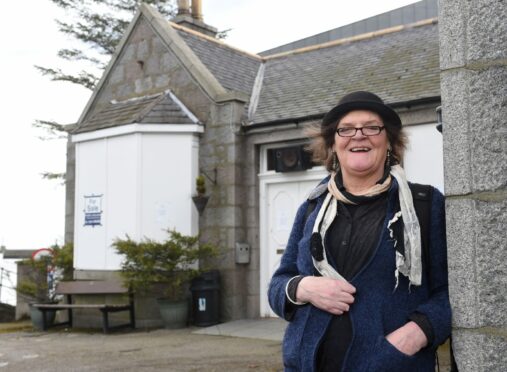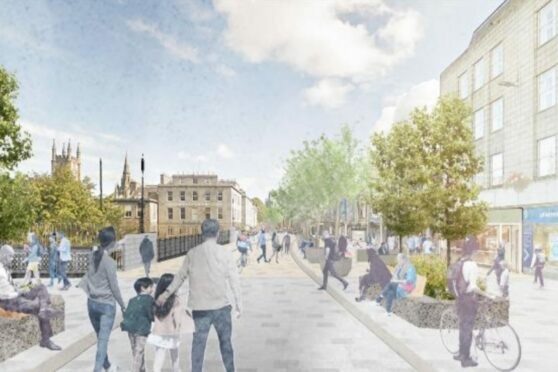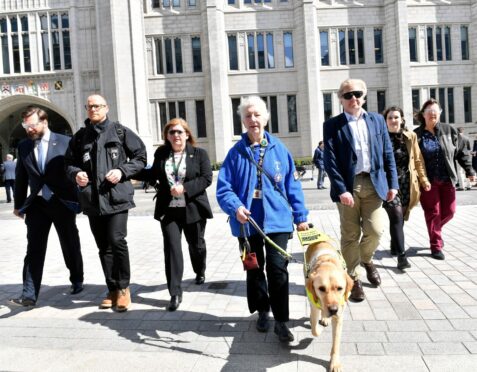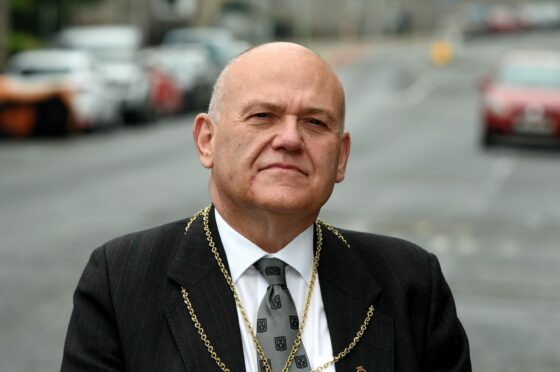A disabled woman has urged the city council to ensure Union Street remains accessible to all when it is pedestrianised.
Aberdeen City Council agreed last week that all cars and public transport will be banned from the Granite Mile between Market Street and Bridge Street.
But a representative from the Aberdeen City Disability Equity Partnership warned the move would impact those with disabilities, the elderly, young families and people with mobility difficulties by “effectively engineering them out of the heart of the city”.
Now Torry resident Renee Slater, who has had difficulties breathing and walking since being diagnosed with cancer four years ago, has echoed that warning – saying she had struggled to access the city centre when the Spaces for People Covid measures were in place.
She fears the pedestrianisation will make those problems permanent.
She said: “I’ve really been housebound because of the issues with Covid, and for the last two years I really haven’t been able to get out the house.
“What I have been able to do is meet my friends every now and again, three or four times a year so far. The only way I can do that is to meet them where we normally meet, and I normally go to Ma Cameron’s [on Little Belmont Street].
“It was fine before, because I’d take a taxi and it would let me off right outside the door. Now they drop me off at the Triple Kirks and I’ve got to walk down.
“That becomes a real issue for me, because it takes me about an hour to walk round from the Triple Kirks because of my breathing. So I’ve had to stop meeting my friends.”
Now she is concerned that disabled people who would usually take a bus or taxi to Union Street will also be forced to make their own way.
‘Incalculable’ economic toll
Similar worries were raised on Friday by disability rights expert Hussein Patwa, the representative sent by the city’s equity partnership.
He said: “The proposals as laid before you, predicated on the full pedestrianisation of Union Street Central, will see a once vibrant, welcoming, and resourceful city become a ghost city and, in reality, a no-go zone for a significant majority of disabled people and others.
“The economic toll on a city still recovering from the ravages of the Covid-19 pandemic through redirection of the disposable income of these citizens will be incalculable.”
Previously, accessibility concerns were raised about Broad Street – with two blindness charities calling for major improvements as people with sight issues were “too scared” to use it.
Guide Dogs Scotland and the RNIB said a lack of kerbs and crossings on the road, which runs outside Aberdeen Council headquarters in Marischal College, meant people were at risk of being hit by the buses that still had access.
A spokeswoman for the local authority said design development work on the street was under way when Covid struck, and alterations to that design are currently being considered in response to pandemic-related changes in traffic patterns.
‘We’re not a shield in any way’
At last week’s meeting on the masterplan, Lord Provost Barney Crockett spoke in support of the pedestrianisation and accused his opponents of using disabled people as a “human shield”.
Ms Slater, who said she is in favour of pedestrianisation as part of the green movement, said: “We’re not a shield in any way, and we don’t want to be a shield to stop people having access to pedestrianisation. But we want access ourselves.”
Mr Crockett said: “I’m still in the business of fighting for the people who have needs, that’s why I’m in politics and that’s what geared my career before I was in politics.
“I’ve been fighting for equality all of my working life, as a teacher and as a worker in equality charities, and I’ll continue to do that.
“No comment of mine was in any way critical of disabled people or of their needs, it was critical of politicians who I believed, honestly, were making cynical use of issues, which gets my anger.
New Aberdeen stadium a step closer as council considers funding for arena
“I think the movements for pedestrianisation and inclusive mobility across the world are seen as walking hand in hand, and I think we’ve definitely been behind on the pedestrianisation and I think that’s got an impact on inclusive mobility.”
He added: “I don’t think it does take agency from people with disabilities, I would be in favour of enhancing any agency.
“If that was the impression, then I would very much regret that. But I don’t regret being critical of those who, I believe, make cynical use of any person whether disabled or not, and I will always speak fearlessly on that issue.”
Thousands of responses to consultation
A spokeswoman for the local authority said they would continue to engage with the Disability Equity Partnership after the approval of the plans.
She said: “We have held extensive public consultation on the city centre masterplan itself, and also for individual projects as part of the CCMP.
“Stakeholder engagement has been undertaken with groups around the city for accessible parking, cycle facilities, bus stops and routing, taxi ranks and servicing arrangements, and traffic management in the city centre and beach areas.
“As part of the latest CCMP public consultation held last year, we held an on-line simulator exercise which had a total of 7,697 responses.
“The last entry in the simulator exercise was an open question asking what improvements or changes would people like to see and we had 2,000 individual responses to that.
“We have held extensive engagement with key stakeholders, including children and young people and the Disabled Equity Partnership, on key elements of the city centre proposals in the last few months and this will continue.”



